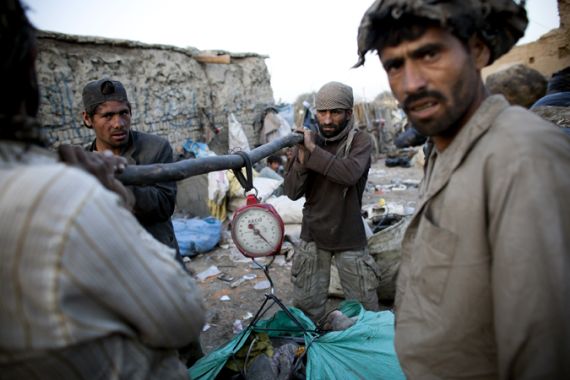US: Afghan war ‘on track’
A US review of military plans in Afghanistan and Pakistan claims progress against resurgent Taliban and al-Qaeda.

 |
| Obama admitted that progress had not come fast enough. [Reuters] |
Barack Obama, the US president, has said that the US plan in Afghanistan is “on track” but warned that gains won by his strategy, which saw an extra 30,000 US troops, had come at a heavy cost and were fragile and reversible.
Unveiling an unclassified version of the long-awaited policy assessment at the White House, Obama on Thursday said progress was sufficient to permit a “responsible reduction” of US forces to begin in July, although the scope and size of the likely withdrawal appears limited.
Despite warning the Afghan war remained a “very difficult endeavour,” Obama said a relentless US operation had put al-Qaeda under more pressure than ever and argued that US troops had made “considerable gains” against the Taliban.
However, Al Jazeera’s Hashem Ahelbarra, reporting from Kabul, said that the feeling there was that, “the Americans have failed to deliver on the promises to defeat the Taliban”.
“The Taliban are stronger than ever,” Ahelbarra said, summing up the feelings of the Afghan people. “They [the US] have also failed to deliver on the promises to provide the Afghan people with governance when the government now is practically dysfunctioning.”
Ahelbarra said that the US is focusing on its gains in southern Afghanistan, indicating that those gains could be replicated across the country.
“But when you look at the north, you’re seeing the Taliban gain more ground and expanding their reach,” he said.
Progress ‘evident’
Obama also said his new strategy, announced a year ago, had brought a new recognition in Islamabad of the threat posed by violent networks in the rugged Afghan border regions.
| In Depth | |||||||||
|
The overview, the result of a two-month National Security Council assessment, said progress in Afghanistan was evident in gains by Afghan, US and NATO forces against Taliban bastions in Kandahar and Helmand provinces.
But the study was short on details and supporting evidence, and did not include pointed criticisms of the Pakistani and Afghan governments which have featured in US government documents leaked in recent months.
Although it pledged to work with Afghanistan to improve governance and reduce corruption, it did not mention the countrywide graft that manfy analysts see as endemic to Afghanistan.
Hillary Clinton, secretary of state, insisted, however, that the administration was not trying to sugar coat the war effort, after the bloodiest year yet for foreign troops in the nine-year conflict and public US spats with Afghanistan and Pakistan.
“I don’t think you will find any rosy scenario people in the leadership of this administration, starting with the president,” she said.
“This has been a very, very hard-nosed review.”
Major troop withdrawal unlikely
Obama, under pressure from his liberal base, said when he announced the additional 30,000 troops for Afghanistan last year that US troops would begin a conditions-based withdrawal in July 2011.
He argued on Thursday that his target had galvanised allies into a more urgent effort to ensure Afghans begin to assume control of their own security.
Al Jazeera’s Patty Culhane, reporting from the White House, noted that there were details excluded from the unclassified version of the report.
“What’s lacking in this report … is any sort of exact numbers and what kind of troop drawdown he expects to be able to order by this summer,” Culhane said. “So there are very definitive specifics that are missing.”
Indeed, senior military figures have appeared uneasy with the July 2011 date, and it appears unlikely that large-scale troop withdrawals will ensue.
Robert Gates, secretary of defence, also said the pace of US redeployments was unclear after next year.
“In terms of what that line looks like beyond July 2011, I think the answer is, we don’t know at this point. But the hope is that as we progress, that those drawdowns will be able to accelerate.”
Cautiously optimistic view
The report trod carefully on uneasy US anti-terror ally Pakistan, following pointed criticisms of Islamabad’s nuclear safety and other areas of policy revealed in the US cables published by the WikiLeaks whistleblowing website and other reports.
Progress in the Washington-Islamabad alliance had been “substantial” but “uneven” in the last year, and some adjustments were necessary, the report said, citing the need for greater co-operation with Pakistan.
Critics of US strategy are likely to argue the review leaves key questions unanswered, including whether Afghan military and governing structures will ever be sufficiently robust to secure US gains.
Administration officials have also played down intelligence reports cited by newspapers, which paint a less optimistic picture of the war than the administration report.
The intelligence assessments, the New York Times newspaper reported on Tuesday, seemed at odds with claims from the defence department and White House officials that US and NATO troops are making progress against the Taliban.
Progress in Afghanistan has come at a high cost: more foreign troops – nearly 700 – have died in 2010 than in any year of the war and Washington has waged public spats with Kabul and Islamabad.
The war also faces waning public support: 60 per cent of Americans surveyed in an ABC News/Washington Post poll out on Thursday believe that the war is not worth fighting, up seven points since July.
